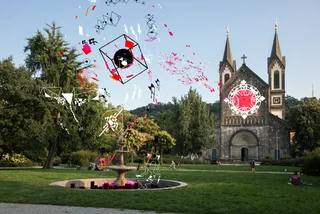Samuel Beckett’s modern classic play “Waiting for Godot” is coming to Prague’s Divadlo Na Prádle for five shows on Oct. 8, 9, 14, 15, and 16. The play, with themes of boredom and of course endless waiting, takes on new significance in the era of lockdowns.
Lane Davies – whose credits include a recurring role in the 1980s soap “Santa Barbara” and an appearance on “Seinfeld” among many other TV and film roles – directs and stars as Vladimir. The other main role of Estragon is played by Gregory Gudgeon, who has worked with Shakespeare’s Globe in London and appeared in the original London cast of “The Lion King.”
Davies said this is his first time doing the play, but it doesn’t seem like it. “We first started talking about it in May 2019. We started rehearsing it for 2020 and needless to say all plans for 2020 went up in smoke. We’re thrilled to get it on its feet in front of people instead of on a computer screen staring at each other,” Davies said. Rehearsals took place over Zoom, with Davies in the U.S. and Gudgeon and other cast members in the Czech Republic.
There have been several notable productions of the play, such as one with Steve Martin and Robin Williams in 1988 and another with Ian McKellen and Patrick Stewart, which debuted in 2009. Davies and Gudgeon are aware of those, but are focusing on their own take, “You hit a certain point where you don’t want to see or think about how other people have been doing it; you want it to be your own performance,” Davies said.
Beckett described the play, which premiered in 1953, as a tragicomedy.
“It’s a funny play. But the situation the characters are in is not funny. They’re homeless. They are two men who have had lives and lost everything and are now at the mercy of the elements,” Davies said.
“Every character in the play represents a different aspect of the human condition,” he added. Aside from the leads, there are three other characters.
“That makes for the play to have layer upon layer of allegories. Almost every action or line in the play can be taken at several different levels. We’re playing for the reality of the situation and the characters, as much as we can: Two characters who are insanely bored waiting for something. … And we’ll let the audience make their own individual conclusions,” he said.
The two main characters are the middle part of humanity, according to Davies. “Estragon tends to be more earthbound, which is why he is always concerned with his feet and his boots. Vladimir is more of a thinker, which is why he has trouble with his hat,” he said. “It’s one of the many metaphors in the play.”
Despite the rather grim setting, the play is more comedy than tragedy. “You would have to work very hard not to make this a funny play. On the surface, it looks like it would be deadly dull, but once you get your mind around the dialogue it moves very quickly and it is very funny,” he said, comparing the lead characters to an old married couple that bickers and jokes.
The main allegory in the play, Davies said, was that people fill their lives with activities that seem to mean something but don’t.
“Samuel Beckett was warning people against throwing their lives away in meaningless activities when there is so much more to be found,” he said.
“Waiting for Godot” is still under copyright, and the estate of Samuel Becket doesn’t allow directors to make many changes. Attempts to make all-women productions, for example, have ended up in court. “You’re not allowed to take liberties with it. … He even specifies the type of hats.” The set is also limited to a single tree and a mound, plus a moon that comes up.
Davies praised the rather spartan Divadlo Na Prádle as a fitting venue for the minimalist play, saying the ambiance helps to accentuate the themes.
“Waiting For Godot” is being presented by Prague Shakespeare Company as part of its fall schedule. They will also be staging Lauren Gunderson’s “The Revolutionists,” Duncan Macmillan’s “Every Brilliant Thing,” Jim Helsinger’s “Dracula: The Journal of Jonathan Harker,” Laura Eason’s “Sex With Strangers,” Shakespeare’s “A Midsummer Night’s Dream,” and Arthur Miller’s “The Crucible.”












 Reading time: 3 minutes
Reading time: 3 minutes 























